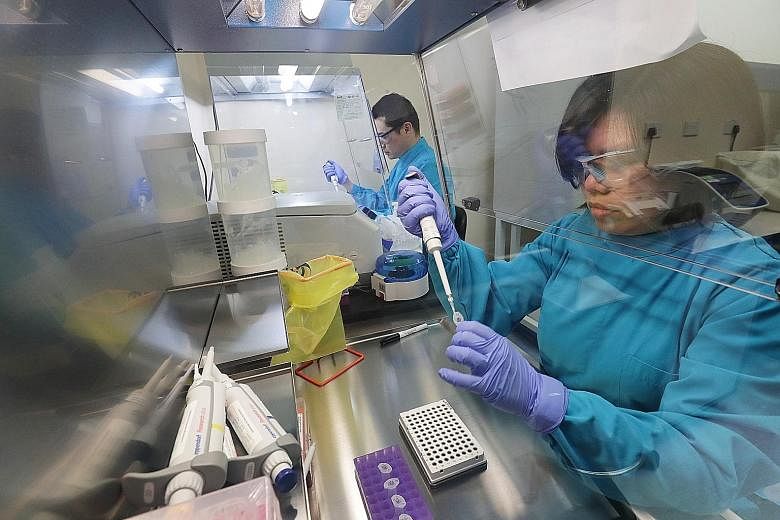Singapore scientists are working with international partners to develop a trial for a vaccine for the coronavirus, with plans to begin testing it in as soon as four months.
The Health Ministry's (MOH) chief health scientist, Professor Tan Chorh Chuan, said that Duke-NUS Medical School is working with the Coalition for Epidemic Preparedness Innovations (Cepi) to roll out a vaccine trial here.
The Straits Times understands that this could happen in as soon as four months.
Time is needed to develop the vaccine and test its safety and suitability for use on patients, Prof Tan said during a news conference yesterday.
The meeting saw nine of Singapore's infectious disease experts gathering to detail what is being done to fight the virus, on both the science and health fronts.
The trial will involve giving the vaccine to healthy volunteers, who will be monitored for side effects.
They will also be observed to see the effects that the vaccine has on their immune system.
Cepi, headquartered in Norway, is a public-private alliance that aims to derail epidemics by speeding up the development of vaccines.
Globally, scientists are racing to develop a vaccine against the virus. The process typically takes years and involves a lengthy process of testing on animals, clinical trials on humans and regulatory approvals.
Professor Wang Linfa, director of Duke-NUS' Programme in Emerging Infectious Diseases, said that, however, Cepi already has several processes prepared, including methods of production, which can be quickly used when a new virus emerges.
"So, when the virus comes, it is just plug-and-play," he said.
TREATMENT
Research is also under way to develop anti-viral drugs, which can benefit patients in the nearer term.
Prof Tan said that the National Centre for Infectious Diseases (NCID) is working with various parties to repurpose currently available drugs for patients who are severely ill.
Associate Professor David Lye, director of NCID's Infectious Disease Research and Training Office, explained: "Repurposed drugs are drugs which have been shown to work in the lab on animal models. They have a safety profile which allows them to be tested on humans."
However, he noted that there is a need for further trials to test the efficacy of such drugs.
China has been testing how effective such drugs are in combating the coronavirus, and Thailand's Health Ministry said previously that Thai doctors who gave the drugs to coronavirus patients had reported promising initial results.
So, NCID has been in discussion with global experts, including those from the World Health Organisation, to develop a randomised controlled trial protocol.
"We hope to bring to our Singapore patients a proper randomised trial very, very soon," said Prof Lye.
WHO WILL BE WORST HIT?
NCID's executive director, Professor Leo Yee Sin, said that 19 patients with the virus have been recruited into a study to better understand the virus and identify who would be most at risk.
To do so, biological samples from the patients, including blood and stool samples, are collected for analysis.
They will be compared against the clinical progression of the patients as their conditions develop, to study how their immune systems change with the progression of the infection. This may pave the way for researchers to determine key periods for treatment and intervention.
Known as Protect, the prospective study is the result of a protocol which was developed in 2012.
It aims to detect new pathogens and characterise their clinical features, as well as determine their transmission risk, and how they interact with their hosts, among other things.
Prof Tan said: "To fight a war, you must know your enemy. This is a new virus, we need to know what we are dealing with."











